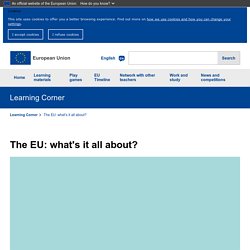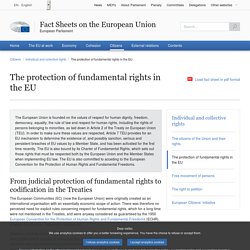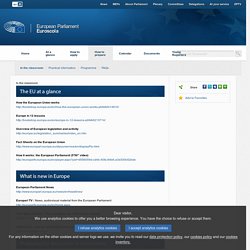

Students experience a session as a MEP, engaging in the EU decision-making through debates in the hemicycle, negotiations with their colleagues, voting and adopting resolutions on topical European issues.
Tu connais l'UE ? Renseigne-toi ici ! Learning Corner. The EU: what's it all about? An official website of the European UnionAn official EU websiteHow do you know?

All official European Union website addresses are in the europa.eu domain. See all EU institutions and bodies Cookies This site uses cookies to offer you a better browsing experience. Find out more on how we use cookies and how you can change your settings. À voir : qu'est-ce que le Parlement européen ? « Parle-moi européen » : le nouveau podcast qui décrypte l'UE.
LEurope nouvelle generation Livret sur lUE. Europe in 12 lessons. EU&ME. #EUandME STORIES. European Youth Event - Accueil. « Parle-moi européen » : le nouveau podcast qui décrypte l'UE. Instructions. Intro Euroscola DNL. EU Charter of Fundamental Rights. EU Charter of Fundamental Rights (English) The protection of fundamental rights in the EU. The European Union is founded on the values of respect for human dignity, freedom, democracy, equality, the rule of law and respect for human rights, including the rights of persons belonging to minorities, as laid down in Article 2 of the Treaty on European Union (TEU).

In order to make sure these values are respected, Article 7 TEU provides for an EU mechanism to determine the existence of, and possibly sanction, serious and persistent breaches of EU values by a Member State, and has been activated for the first time recently. The EU is also bound by its Charter of Fundamental Rights, which sets out those rights that must be respected both by the European Union and the Member States when implementing EU law. The EU is also committed to acceding to the European Convention for the Protection of Human Rights and Fundamental Freedoms. From judicial protection of fundamental rights to codification in the Treaties. 10 years of the EU Charter of Fundamental Rights.
European Union. Goals and values of the EU Goals The goals of the European Union are: promote peace, its values and the well-being of its citizensoffer freedom, security and justice without internal borderssustainable development based on balanced economic growth and price stability, a highly competitive market economy with full employment and social progress, and environmental protectioncombat social exclusion and discriminationpromote scientific and technological progressenhance economic, social and territorial cohesion and solidarity among EU countriesrespect its rich cultural and linguistic diversityestablish an economic and monetary union whose currency is the euro. Values. Youth & Politics. Euractiv. Euroscola Online. European Parliament euroscola. Dear visitor, We use analytics cookies to offer you a better browsing experience.

You have the choice to refuse or accept them. For any information on the other cookies and server logs we use, we invite you to read our data protection policy, our cookies policy and our cookies inventory. skip to content In the classroom. Euroscola. Euroscola - Accueil. Euroscola Online.